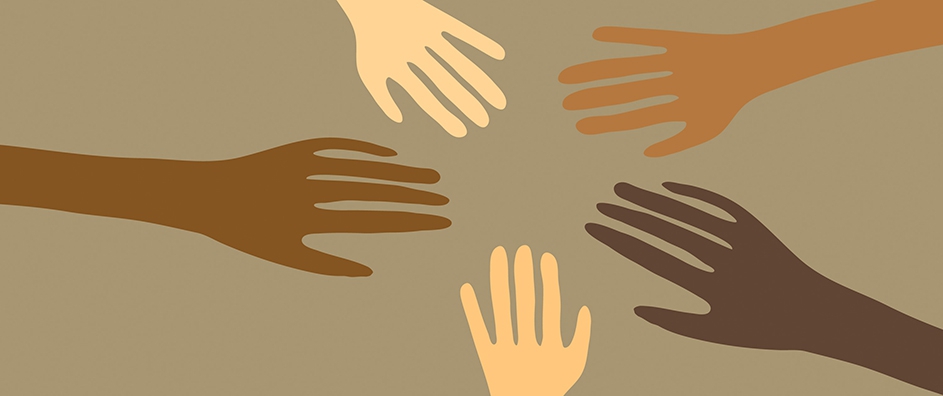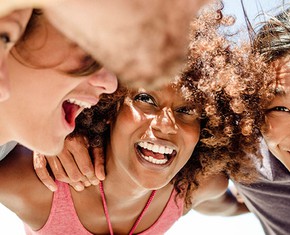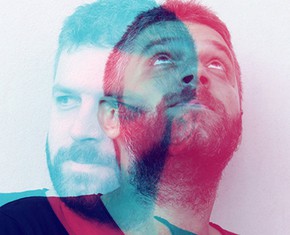The views expressed in our content reflect individual perspectives and do not represent the authoritative views of the Baha'i Faith.
“Will racism ever come to an end?” asks contributing columnist Murray Siegel in the September 3rd edition of Eloy, Arizona’s Eloy Enterprise. His not surprising answer to his own question? “Probably not!” Siegel points to the historic prejudices between people of different “races, ancestry, ethnicity and religion” and the fact that this sad state of affairs exists even today in our shrinking world. He laments that “no legislation could possibly eradicate this behavior.”
Perhaps. I hope not. Legislation by itself won’t change hearts, but it can help keep negative and hostile actions in check. That step allows society an opportunity to work on changing outlooks and understanding, one heart at a time.
Baha’is believe racism can end, if we want it to.
In The Promise of World Peace, a 1985 letter from the elected international council of the Baha’i Faith, addressed “to the peoples of the world,” we read that peace is “not only possible, but inevitable.” For that to happen people everywhere, in every corner of the world, must address several issues:
Racism, one of the most baneful and persistent evils, is a major barrier to peace. Its practice perpetrates too outrageous a violation of the dignity of human beings to be countenanced under any pretext. Racism retards the unfoldment of the boundless potentialities of its victims, corrupts its perpetrators, and blights human progress. Recognition of the oneness of mankind, implemented by appropriate legal measures, must be universally upheld if this problem is to be overcome. – The Universal House of Justice, The Promise of World Peace, p. 4.
The Baha’i teachings have focused on eradicating racial prejudice from their very beginning, when the Faith’s founder wrote this passage in the mid-1800s:
O children of men! Know ye not why We created you all from the same dust? That no one should exalt himself over the other. Ponder at all times in your hearts how ye were created. Since We have created you all from one same substance it is incumbent on you to be even as one soul, to walk with the same feet, eat with the same mouth and dwell in the same land, that from your inmost being, by your deeds and actions, the signs of oneness and the essence of detachment may be made manifest. Such is My counsel to you, O concourse of light! Heed ye this counsel that ye may obtain the fruit of holiness from the tree of wondrous glory. – Baha’u’llah, The Hidden Words, p. 20.
Let us not allow the accident of birth to be an excuse to build walls between us. Prejudice is not innate. We grow up learning it from those who surround us. I have a painting I cherish: two little naked babies, one black, one white, one reaching out to the other. It speaks louder than words. If no one tells them they are different, that they can’t trust each other, they will grow up feeling like equals.
The most important thing is to polish the mirrors of hearts in order that they may become illumined and receptive of the divine light. One heart may possess the capacity of the polished mirror; another be covered and obscured by the dust and dross of this world. Although the same Sun is shining upon both, in the mirror which is polished, pure and sanctified you may behold the Sun in all its fullness, glory and power revealing its majesty and effulgence, but in the mirror which is rusted and obscured there is no capacity for reflection although so far as the Sun itself is concerned it is shining thereon and is neither lessened nor deprived. Therefore our duty lies in seeking to polish the mirrors of our hearts in order that we shall become reflectors of that light and recipients of the divine bounties which may be fully revealed through them.
This means the oneness of the world of humanity. That is to say, when this human body-politic reaches a state of absolute unity, the effulgence of the eternal Sun will make its fullest light and heat manifest. Therefore we must not make distinctions between individual members of the human family. We must not consider any soul as barren or deprived. Our duty lies in educating souls so that the Sun of the bestowals of God shall become resplendent in them, and this is possible through the power of the oneness of humanity. The more love is expressed among mankind and the stronger the power of unity, the greater will be this reflection and revelation, for the greatest bestowal of God is love. Love is the source of all the bestowals of God. Until love takes possession of the heart no other divine bounty can be revealed in it. – Abdu’l-Baha, The Promulgation of Universal Peace, pp. 14-15.
If we’d all seriously consider these unifying life instructions and begin to live up to them, teach them to our children, become examples to our neighbors, polish rather than tarnish the hearts, I firmly believe we will overcome racism. We begin with tolerance, but strive towards, and eventually achieve true feelings of oneness.
You May Also Like
Comments

















Prejudice may rather end when we realize that we are all equal before God and that they made us so different that there was harmony in the essence of our beauty.
In parents and educators must guide our children to respect and prejudice against the religious issue which also contributes greatly to the issue of racism, sexual option that has grown rapidly even if it is different from what I guide my children so that they are and the question of nationality. That's my humble opinion. Gilmar Gomes. Your comments will be accepted. [email protected]